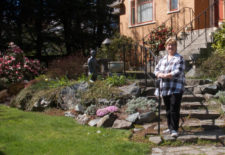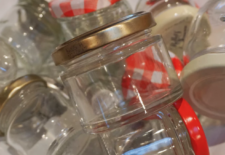What the Oil Tankers Mean for our Orcas
SVO talks to Dogwood Initiative & the Orca Rescue Society
by Sue Stroud, citizen reporter
This is the question the Saanich Peninsula Dogwood Initiative group hopes to answer later this summer. Following the successful Orca Day recently held at Esquimalt Lagoon the group plans to replicate it jointly with other Dogwood & environmental groups along the Dallas Road waterfront. The date of this event is to be announced once permits are purchased and planning completed.
“We thought about holding the event at Island View Beach which would provide a magnificent backdrop for it, but realized the real goal is to reach out to as many people as we can with information about orcas and what a huge increase in tanker traffic will do to them,” said Aaron Baxter, co-chair of the SaanPen group. “We think that once people can visualize the problem they’ll be more motivated to act.”
“At last Saturday’s planning meeting, Doug Davies, who helped coordinate the earlier event, told us that each Aframax tanker carries 120 million litres of dilbit which is enough to fill six Olympic sized swimming pools. With as many as eight of these per week sailing through the Salish Sea among all the other ships, boats and tankers, the chances of an accident are greatly increased.
“Another thing to consider is that when the Kinder Morgan tank farm was built, the population of Vancouver was only 340,000, now it’s ten times that number and no one would allow a tank farm to be built in that area today. Expanding an existing one is foolish and the Burnaby Fire Department is opposed to it.”
At the Esquimalt Lagoon event the Orca Rescue Society brought life-size inflatable stand-ins for real orcas from the Southern Resident Orca pod: L94 “Calypso” the matriarch of the pod, L41 “Mega” a male, and L86 “Surprise” a female. They have just finished replicating a fourth orca – L123, the youngest member of the pod at three years of age.
Eric Pittman of the Society says, “[Prime Minister] Trudeau shut down the Northern Gateway Pipeline to protect the Great Bear Rainforest, here he is ironically doing the opposite, building a pipeline that will endanger the last 76 Southern Resident killer whales (orcas).
“This pod is genetically distinct from other orcas, they have a very small jaw which means they cannot eat seals or other larger prey, they subsist on salmon which are also at risk from spills.” Pittman adds, “If you hang on to fossil fuels you will become a fossil. This pipeline, when finished, will provide fewer jobs than a White Spot Restaurant.”
Tankers hold many perils for the wildlife in the Salish Sea including spills, which can cause loss of habitat, loss of food, and the whales own lives. But it’s not just a spill that threatens the orca population; the shipping traffic itself is a threat. The noise from ships can interfere with orcas’ ability to coordinate hunts and members of pods may even get lost if they are not able to hear, according to the researchers. This is enough of an issue that Ottawa has promised to take action to ameliorate these problems.
Collisions with whales is also an issue. Orca J34 was killed in just such a collision in December of 2016.
Because of these multiple dangers the Orca Rescue Society has two main goals. First, to win orcas “rights of nature” legislation, which means citizens can sue on behalf of the orcas and their environment. This kind of legislation is not unique. It’s showing up around the world as people fight environmental degradation. “Why should a sentient being, like an orca, have fewer rights than a multi-national corporation,” asks Pittman.
The second goal of the Orca Rescue Society is to enhance the food supply of the orcas by supporting salmon hatcheries. “Canada has very few hatcheries,” Pittman says, “but the US has many along the coast and releases thousands of fish to help feed the orcas. It’s like a foodbank for whales.”
With a new International Marine Organization announcement limiting the amount of high sulphur fuel (bitumen) ships can carry by 50% taking effect in 2020 and questionable market interest for the tar sands bitumen, groups like Dogwood and the Orca Rescue Society can’t see the point of expanding pipelines and increasing tanker traffic to up to 350 extra tankers per year through the Salish Sea.
“It only takes one spill to destroy whale habitat, First Nations cultural use of the sea and shore and jobs in tourism, restaurants, the film industry, the fisheries and more. Canadians love the Pacific coastline, now it’s time to protect it,” says Baxter.
“Come to our event later this summer, listen to the whale songs with us, look at the lovely waters around us and ask yourself what price you put on nature?”


